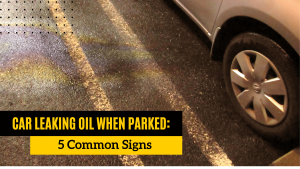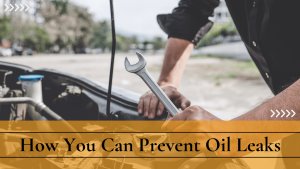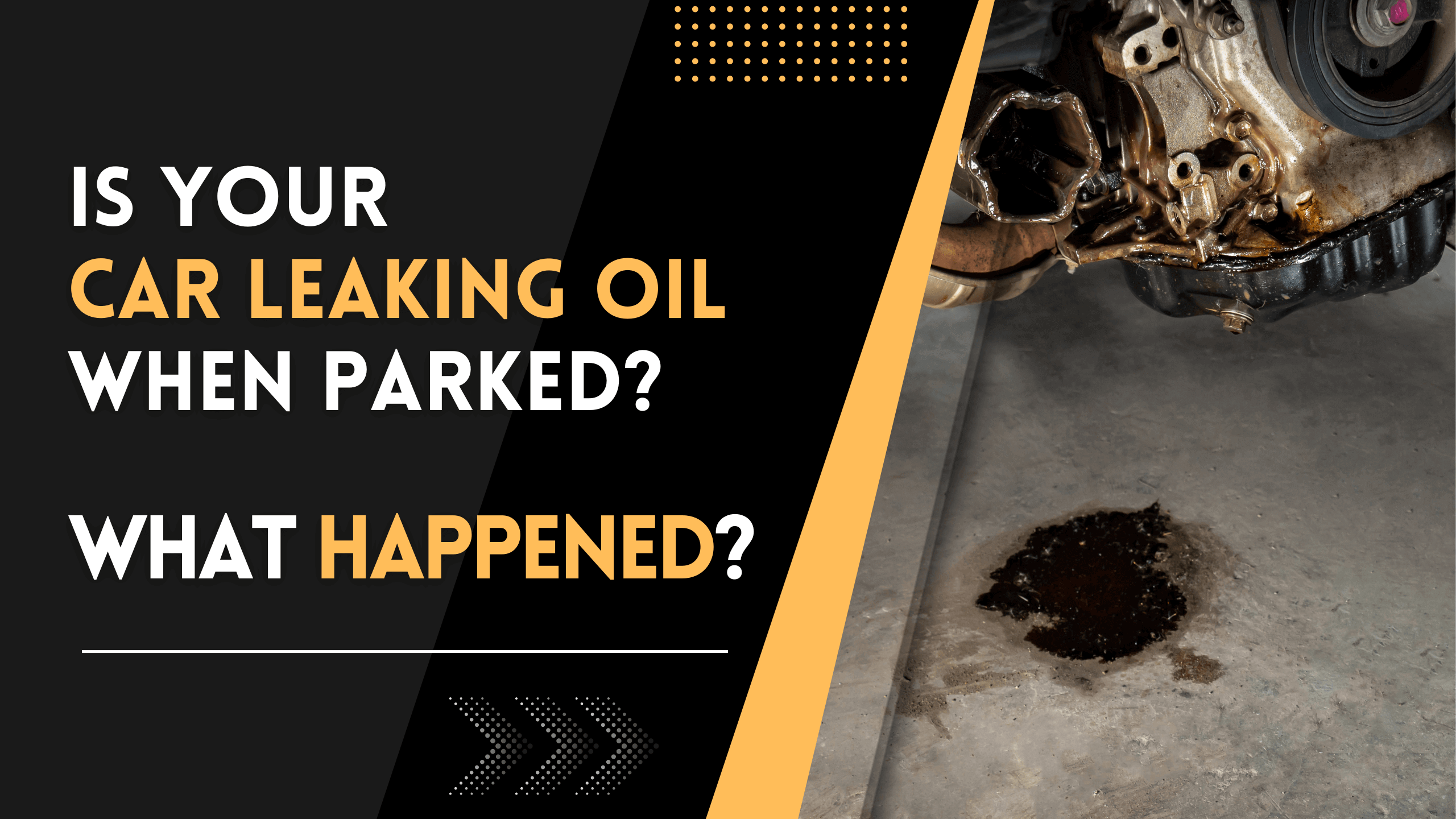If your car is leaking oil when parked, your engine may be having problems. learn how to spot potential oil leaks and how to correct them.
Oil to your car is like nutrients to your body. Maintaining clean oil is one of the most important things you can do to take care of your car. Nevertheless, many car owners don’t do it, and its consequences can be disastrous.
Imagine that on a fine day, when you are taking out your car from your garage, you notice that your car leaking oil when parked. This can be a pretty confusing and cumbersome situation for you. It might also happen that your car is leaking oil when parked. There is no problem with the oil, and it isn’t hazardous, although it may make a mess on the floor. It usually results from worn-out oil seals or engine gaskets. Sometimes these parts will deteriorate with time, but if you have this kind of leak, it might also be because your oil is unclean and old, possibly because you haven’t performed an oil change recently enough.
Several homemade solutions are available for this problem, such as using silicone glue to fill any gaps around the engine block. It can also be solved using car-specific materials available at your local garage dealer. However, these solutions may be messy and time-consuming to accomplish.
Antifreeze can leak crimson in certain situations, but it’s usually transmission fluid. If the leak is blue, it seems to be leaking windshield wiper fluid. The red color liquid is most likely transmission fluid that has been flowing in the car for a long period. And the pink color liquid is most likely a steering fluid leakage. If the liquid seeping from your automobile is dark brown, it is most likely engine oil or old brake fluid.
Howsoever the leak looks like; you ought to take care of it and fix it before the situation gets even more tricky.
But Actually, What Causes Oil To Leak
Let us quickly understand some of the factors responsible for an oil leak.
An Outdated Oil Filter
A damaged or deteriorated oil filter is among the most prevalent reasons for car oil leakage in an automobile. A motor oil filter is in charge of removing pollutants from the oil before it causes damage to your vehicle. Most perform as expected, but after several thousand kilometers on the road, they begin to disintegrate due to usage. When the filter ceases to function, the oil begins to leak. Furthermore, pressure from within the engine may allow the oil filter to become loose and displaced. In either case, repairing or changing an oil filter is a simple procedure that may be completed.
A Filler Cap That Is Loose Or Broken
Another typical car oil leak caused is when the oil tank filling cover gets loose or develops cracks. When this happens, obvious oil puddles will soon accumulate below your car or collect around the engine. Whenever it comes to an oil leak under a car and its repairs, it may be done in a matter of seconds. First, ensure the filler cap is not too loose. If it will not remain in place, simply purchase a new filler cap and get it applied.
A Break In The Gasket
Gaskets are an integral component of every automobile engine. They are in charge of transferring fluids such as oil, coolant, as well as gas throughout the vehicle. However, gaskets often deteriorate with time, causing the seals they generate to weaken.
This normally occurs after a lengthy period of time, often 100,000 kilometers. If this is the reason for the oil leakage in the car, you will be required to contact a specialist who understands how to repair a fuel leak in a vehicle of this type.
Excessive Oil
Often, what appears to be an oil leak is only the consequence of a simple error, and there is no reason to be concerned. If you notice oil puddles beneath your car, however, and the engine oil indicator on the dashboard is not blinking, you may have simply put excess oil into the vehicle, producing an overflow.
It’s also conceivable that you spilled some oil while filling it. If that is the case, just wipe up any spilled oil just on the engine using a towel. Using a dipstick tube to drain excess oil should also cure the problem.
Impairment Of The Oil Pan
When driving, your oil pan may be well struck, especially in inclement weather or while off-roading, where even the underbelly of the car is more vulnerable to damage.
This could result in an oil leakage caused by a hole in the oil pan or a dent producing an oil drain plug mismatch.
Car Leaking Oil When Parked: Common Signs

Low Engine Oil
Whenever you check your car’s oil level, you want the oil dipstick to indicate that the oil is full. If it’s less than that, your automobile is leaking oil. This occurs mostly because a seal someplace in the engine is not correctly sealing, allowing oil to leak out. A gasket, O-ring, and piston ring might be involved. Another option is that the oil pan is fractured or otherwise damaged. If you believe that your vehicle is leaking oil, park it on a flat surface and check the oil after a few hours. If the level falls, you’ll know it’s time to have it repaired.
Oil Puddles In The Driveway
If you park the automobile in the garage overnight and wake up to find an oil puddle on the floor, it’s a sure-shot thing that your car is leaking oil when parked. Determine if the puddle is flowing from the front or the back of the vehicle. If it’s coming from the front, it’s most likely due to a problem with the oil pan as well as the engine gasket. If it’s coming from the back, there might be a leak in the rear main seal. This is a more significant problem that will need expert assistance. Oil puddles can also appear if your vehicle’s transmission fluid, power steering, or coolant leaks.
Rough Engine Idling
If you find your car’s engine idling rough, it might be an indication that your car is leaking oil when parked. This happens when the engine doesn’t get enough oil, causing the components to wear out early.
Furthermore, if the oil leak is significant enough, it might cause the engine to overheat, causing further damage.
Low Oil Pressure Indicator
The little oil pressure light is frequently visible when your vehicle is losing oil. A sensor checks the oil level in the engine, and if it falls below a certain level, the pressure sensor activates the warning light. So, if your automobile leaks oil when parked, the oil level will most likely be low enough to activate the sensor whenever you start driving.
Burning Oil Smell
Finally, if you detect a burning oil smell emanating from your automobile, it is most likely due to oil leakage. Leakage is a typical cause of burning oil odors, which can occur for a variety of reasons. For example, if such an oil seal is compromised, oil might leak from the engine.
Locate An Oil Leak in Your Car
To begin, look for a leak over clean surfaces so that a greasy mark may be easily identified. Degreaser should be sprayed all around parts, hoses, brackets, oil pans, and beneath the chassis. Power wash all relevant components while the engine is cool and according to the manufacturer’s recommendations. Washing your engine when it is cool reduces the possibility of producing steam, which can cause electrical problems. After cleaning your engine or suspected leaking components, you’ll need a starting place to begin your search. If you suspect a leak due to a few oil marks on your garage floor, put some old newspapers beneath your car to assist you in pinpointing the oil source. Examine the engine, gearbox, and steering system for moist, darker spots. Ascend the damp area to its highest point. See where the oil traces lead.
Pay careful attention to the gaskets and seals surrounding the leaky locations. They will cause issues as they deteriorate over time.
An oil drain plug, cylinder head gasket, and valve covers surrounding the top of the engine are other frequent locations for oil leaks.
How You Can Prevent Oil Leaks

Service Once A Year
Important appliances in your house, such as your air conditioner or refrigerator, frequently require servicing, ranging from once a year to anytime an issue develops. An oil tank is unique. Because it carries such potentially hazardous liquid, oil tanks check for at least a year, regardless if there is a problem. This makes them operate more smoothly and last longer. If you are unsure about inspecting your oil tank yourself, hire an expert to come out once a year.
Replace Before A Problem Arise
It pays to be proactive instead of reactive in all facets of life. The same is true for commercial oil tanks. Don’t wait for a possibly dangerous leak to worsen before replacing your tank. Be proactive and keep your oil tank’s lifespan in mind. They normally have a lifespan of no more than fifteen years. So, when the timer runs out, go ahead and replace your tank. Even if no visible damage is visible, climate takes its toll on your tank, so be proactive and preventative for the safety of your commercial property and the environment.
Coverage For Insurance
It’s critical to understand the scope of your insurance coverage, whether it’s for your automobile, your house, or your business real estate. Don’t expect insurance to cover every car injury that happens. Know what you can rely on ahead of time. This might come in handy when it comes to your car tanker. Insurance for your tanker is typically not included in the insurance for your property. So make sure it is included, and if you’re able to afford it, add this security to your policy. A leak or spill that is not avoided might result in a significant financial burden. Insurance can help you get better service to prevent spills and will cover any damages that may occur as a result of a spill.
How An Expert Car Mechanic Can Help You In Oil Leaks
If you discover broken seals or a damaged gasket, take your automobile to an auto repair shop to visit a professional who will assist and educate you on how to cure an oil leak. You may stop the leak from growing worse by filling the gaps between the seals on the metal sections of the engine. Steps that the expert car mechanics follow are:
1. Inspecting the vehicle
2. Fixing The leaking
3. Using an additive
4. Using tools
5. Testing the Oil Pan
Common FAQs
1. Can I Drive A Car With An Oil Leak?
Yes, you can drive a car with an oil leak, but in the long term, it may be dangerous for your car as well as you.
2. How Long I Can Drive With An Oil Leak?
It is usually best not to drive if your car has an oil leak. However, short-distance drives of less than 10 miles are not as harmful in terms of dropping your oil levels to a dangerous level.
3. How much does fixing an oil leak in a car cost?
A repair may easily fix a leaky gasoline line for anything between $60 and $120.
4. Are small oil leaks common?
Yes. If you’ve been monitoring the oil for three months and the level has been relatively constant, you’re not leaking a lot of oil. That suggests the gaskets are not leaking significantly.
5. How serious is an oil leak in a car?
Driving a car with an oil leak is not advisable for several reasons:
- Driving with insufficient oil levels might cause engine damage.
- An automobile that is leaking oil poses a fire risk.
- Other elements of your car, such as hoses and seals, may be damaged early.
6. Do you need to replace the car oil if you have an oil leak?
No, If your automobile is leaking oil, simply changing the oil will not cure the problem.
